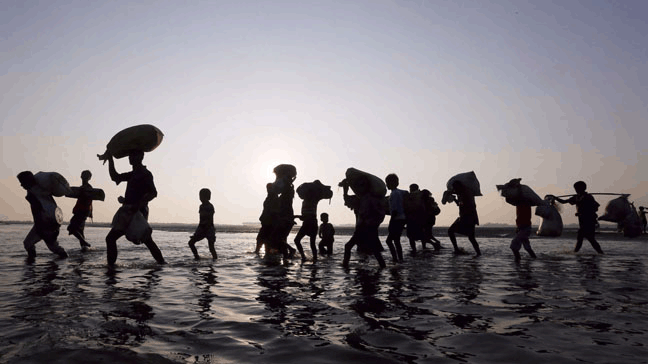Table of Contents

While we want to control immigration in this country, we have to acknowledge that the plight of genuine refugees, before they get here, can be grim. Having to leave their homelands to an uncertain future, leaving virtually all of their belongings behind and spending years in camps waiting for resettlement is not much of a way of life for anyone. But for those who do make it here, their future is reasonably assured, in a peaceful country where they are looked after by the state until they are able to stand on their own two feet.
It seems, however, that New Zealand is not living up to expectations for some refugees.
quote.An Iraqi refugee says his family has had to endure cold and damp living conditions in Dunedin because they were not given enough information about the home they were moving into.
He claimed Immigration New Zealand made him sign a lease for an unsatisfactory property before seeing any photos.
It is the latest in a series of complaints by refugees who have come to the city – who say their accommodation is not up the scratch and is even making them sick.
Yacoub Altay and his family of four were granted asylum in New Zealand 12 years after they left Iraq.end quote.
Along the way, they slept in tents, travelled illegally by boat from Malaysia to Indonesia and spent six years in Cyprus.
But when they arrived in an Auckland refugee resettlement centre late last year, Mr Altay said their housing troubles began.
He said Immigration New Zealand got him to sign a rental agreement for a house in the Dunedin suburb of North East Valley – without allowing him to see any photos first.
“When I sign the contract, after that show me the place, I refuse this. I not go there. She say to me this one offer. If accept, go. If not accept, you can go alone, find rental,” Mr Altay said.
I cannot deny, I am very surprised by this. Presumably, the family knew that New Zealand had a much cooler climate than Iraq, and that Dunedin is one of the coldest parts of the country, in the winter anyway. What I do not understand is why he thought he would have the right to pick and choose a house offered to him by the state? The take-it-or-leave-it approach is applied to most people with state housing.
quote.Water drips down the side of the house, leaking through the ceiling and onto the carpet. There are holes in the walls and floor, and they have been told their oven is not safe – only two of the top elements are working.end quote.
All of which must be considerably better than living in a tent or a refugee camp. The house may not be perfect, but after 12 years as a refugee, it must be nice to have somewhere safe and stable to live at last. Who cares if a couple of the elements on the stove don’t work?
quote.His wife has been left effectively housebound because the property’s steep steps and dampness cause her chest pain and shortness of breath. Mr Altay has ongoing knee and chest problems.end quote.
Both of them have medical certificates from Dunedin doctors saying their house is impacting their health.
But they were both fine living in a tent and walking thousands of miles to safety? They could do all that, and got here safely, but now they can’t cope with a few steps and a damp house?
quote.Just down the road, Mustafa Allo and his family live in another cold and damp house.
It’s large enough to house his eight children, but it’s old and too expensive to heat in the winter.
The family’s future is uncertain after their landlord issued them a notice to leave after a year and half at the property.
“Last year I go and ask about Housing New Zealand. Should be I am refugee, I get Housing New Zealand house so they give me private house, and too big, too expensive. It was damp, old,” Mr Allo said.end quote.
It is a pity that, as a refugee, he feels he should receive certain things as a matter of right. Never mind that there is a chronic housing shortage, and with 12,000 people on the HNZ waiting list, he is lucky to get any housing at all.
quote.Another refugee, Ahmad Al Ghanem, who spoke through an interpreter, said the cold, damp conditions in his Dunedin home were making his family sick.end quote.
“They have enough because they have the war in Syria, they suffer a lot in Syria when they have the war,” Mr Al Ghanem said.
Coming to New Zealand was meant to offer a safer and better life, he said.
I am gobsmacked. He is comparing life in a damp house in Dunedin with the war in Syria, which killed thousands, displaced hundreds of thousands, separated families and wrecked all infrastructure. How can anyone compare that with life in Dunedin, even if the house is cold and damp?quote.
“But when they came and they find this issue they feel they’re still in war. It’s not really the standard they wanted life for living with their children.”end quote.
Calls to the landlord garnered no help.
He was told he could leave at any time – but finding affordable, adequate housing is easier said than done.
Just like everyone else who lives here, if you don’t like your state house, you find something better yourself. Yes, it will be very expensive, particularly if you have a large family, but it is no different from anyone else who lives here.
quote.But The Valley Project community worker Charlotte Wilson said families felt disempowered after seeking help from government services and support services without success.
They should have healthy, affordable housing in the suburb of their choosing, she said.
“I feel ashamed that this is what our country has offered. We’ve said we will house you, this can be your home, and this is what the situation is.”end quote.
Newsie
So we should give refugees a much better standard of accommodation than others here, should we? I don’t think that would be right.
For all of those calling out for us to take more refugees, this is the reality of the situation. With a chronic housing shortage and only very poor state houses available, clearly, this does not provide the standard of living that some refugees expect. There is no point in us continuing to take people when we cannot adequately house the people that are already here.





